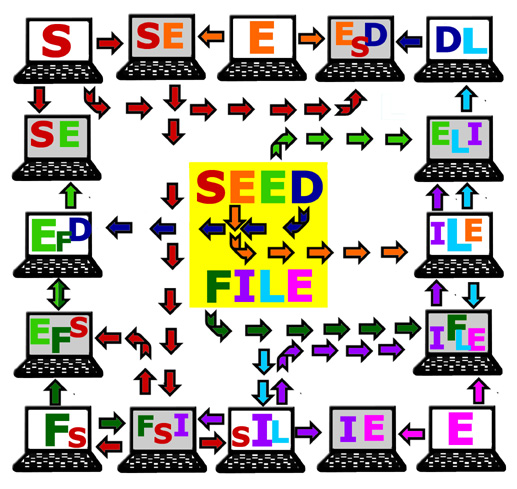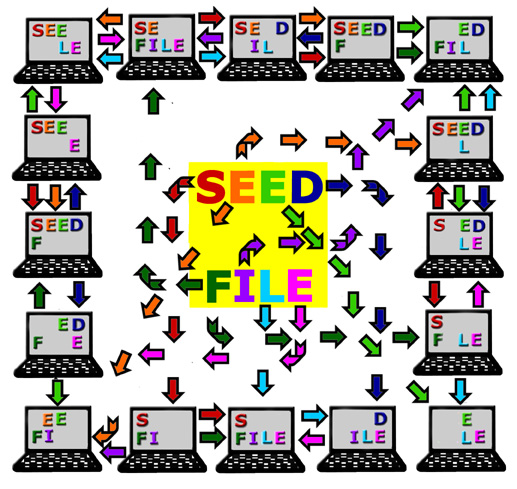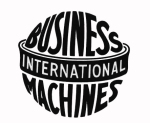
- No Usage Based Billing
[The First Part of this series was <<A: Open Source. The second installment of the Stop Usage Based Billing alphabet series was <<B: Packets and the Internet. The third installment was <a href=”<<C: Deep Packet Inspection, and the final installment will be E: Open Source Deep Packet Inspection]
What is BitTorrent Anyway??
“BitTorrent is a peer-to-peer file sharing protocol used for distributing large amounts of data. BitTorrent is one of the most common protocols for transferring large files, and it has been estimated that it accounts for approximately 27-55% of all Internet traffic (depending on geographical location) as of February 2009.”
BitTorrent is an extremely fast and efficient means of uploading and downloading. BitTorrent is an excellent way to distribute large materials to many people via the internet.
Radical Ideas
Like so many of the radical new ways to do things that technology and the internet have made possible, BitTorrent can only work through co-operation. BitTorrent requires a network of “peers”, or other people’s computers who are willing to share the file. This is referred to as “peer to peer” or “p2p.
If I have a large file I want to transfer, the first step is to “seed” the file, transferring portions of the file to multiple members of the p2p network.

Diagram 1: Seeding
It only takes a small fraction of the file to be passed along before the process speeds up enormously.

Diagram 2: Seeding and Sharing
Once I have a small portion, i pass it along at the same time as I’m receiving new bits of the same file, either from the original seed source of another peer.

Diagram 3: Upload + Download = Speed
With many participants (peers) uploading and downloading at the same time, large files can be distributed very quickly indeed.

Diagram 4: Finish Fast
Bell Canada “Throttles” BitTorrent
When Bell Canada was first caught “throttling” internet traffic to the Independent ISP customers, Bell Canada’s justification to the CRTC was that the internet was too crowded, and that it was necessary to “manage” the traffic. Bell claimed that they needed to employ Deep Packet Inspection to identify BitTorrent Traffic so that they can “throttle” it.
Mandate:
“The CRTC’s mandate is to ensure that both the broadcasting and telecommunications systems serve the Canadian public. ”
Amazingly, the CRTC had nothing to say about Bell Canada’s plans to discriminate against particular Canadian internet users.
The CRTC has accepted Bell’s unsubstantiated contention that this discrimination was necessary, and in approving it they have allowed Bell Canada to think that this discrimination is acceptable. In no way does this serve the Canadian public.
You might almost think that the CRTC mandate was to suppress Canadian creativity and the creation of Canadian movies and music. The availability of the technologies that exist to make it easy to create our own movies and music should be welcomed as an opportunity to add to and help grow our Canadian Culture.
Why single out BitTorrent traffic for throttling if it is an efficient use of the available bandwidth?
One of Bell Canada’s arguments for implementation of Usage Based Billing is that Canadian internet bandwidth is in short supply, making it necessary for them to “manage” bandwidth by penalizing heavy users.
So how could anything as efficient as BitTorrent possibly be seen as a bad thing if the Internet is so crowded?
It doesn’t make sense to discriminate against BitTorrent use. There is nothing inherently bad about BitTorrent use or BitTorrent internet traffic. But Bell Canada’s contention is that BitTorrent is bad because people use it to download movies and music.
Which begs the question: how does that make BitTorrent bad?

The Copyright Red Herring
The “Copyright Lobby”, which consists of large media producers and distributors (like Disney), and corporations and organizations (like MPAA), who distribute commercial movies and music, want us to believe that this is a bad thing.
This corporate special interest group has spent a great deal of time, energy and cash trying to promote the “pravda” that any digital copying of copyright works is bad. Making no distinction between commercial bootleggers who distribute illegal copies for profit and legal purchasers who seek to make a back-up copy or digital format shift for personal use, the Copyright Lobby has been pressuring governments the world over to criminalize personal use copying.
The problem for ordinary citizens is that these corporate interests have vast quantities of money to spend and a great deal of media power. This makes it incredibly difficult for governments to stand up to their onslaught. In some parts of the world this persistent advocacy has paid off for the Copyright Lobby, as lawmakers knuckle under and legislate to the detriment of their own citizens by making it illegal even to copy or download movies or music for personal use.
Here in Canada the Copyright Lobby is seeking to influence our lawmakers to criminalize personal use copying. They are trying to make Canadians think that people who make copies for personal use are performing criminal acts, and should be penalized the same as a a bootlegger who films the latest theatrical release off a theatre screen and proceeds to sell hundreds of thousands of bootleg DVDs.
Once again, Channel Four’s hilarious I.T. Crowd puts this question in perspective with this send-up of a video piracy commercial I found on YouTube.

Strong and free?
Canadian Law says
RIGHT NOW, in Canada, personal use copying is simply not illegal.
RIGHT NOW, in Canada, use of the BitTorrent file transfer protocol is also perfectly legal.
RIGHT NOW, in Canada, peer to peer (p2p) file sharing is legal; Canadians break no laws simply by joining in a p2p network.
The Copyright Lobby’s smear tactics have gone a long way toward making the world believe that BitTorrent is inherently bad.
Bell Canada has convinced the CRTC that it is acceptable to “throttle” BitTorrent, because of BitTorrent’s reputed connection with possible copyright infringement. So although BitTorrent is perfectly legal, Canadian internet users are paying the price for the success of this Copyright Lobby propaganda.
Myth: All BitTorrent/p2p internet traffic consists of copyright movies and music
The Corporate world doesn’t understand radical ideas like Open Source software and p2p file sharing because these concepts are so different from anything appearing in the old business models. Even more incomprehensible to the outdated business models is the fact that it may or may not generate a direct monetary profit.
The classic example of corporate myopia is:
“I think there is a world market for maybe five computers. ”
—attributed to Thomas J. Watson, president of International Business Machines, circa 1943
 For many years IBM has taken the rap for this quote whether or not Mr. Watson really did say it. (Most likely not.) Maybe proving it wrong is part of why IBM is such a going concern in the 21st Century. Having weathered the storms of fortune today’s IBM is a world leader by continuing to innovate and adapt alongside evolving attitudes and technologies. IBM has been steadily increasing their participation and involvement with Open Source software in this new century.
For many years IBM has taken the rap for this quote whether or not Mr. Watson really did say it. (Most likely not.) Maybe proving it wrong is part of why IBM is such a going concern in the 21st Century. Having weathered the storms of fortune today’s IBM is a world leader by continuing to innovate and adapt alongside evolving attitudes and technologies. IBM has been steadily increasing their participation and involvement with Open Source software in this new century.
The reality is that IBM not only understands the importance of open source, the corporation has actively supported and promoted adoption of Linux and Open Office in the corporate world. And naturally BitTorrent is a part of the equation because it is such an efficient means to distribute large files (like for instance, Canonical’s Ubuntu.) 
“Think.”
—Thomas J. Watson, president of International Business Machines
Seems IBM actually does heed their most enduring slogan (which definitely was coined by Mr. Watson). Sadly, this type of foresight is uncommon. Because BitTorrent is such a radical idea, most entrenched corporations simply aren’t capable of understanding it.
There are other uses for BitTorrent that are not only legal, but even perfectly acceptable in polite society.

Probably my favorite use of BitTorrent is the amazing Project Gutenberg. This organization has been digitizing books in the public domain and distributing them freely… via BitTorrent, since this is such an efficient method of digital distribution. After all, BitTorrent is used for transferring very large files like music and movies because it is very efficient.

BitTorrent file sharing is not all movies and music. Like IBM, many people actually use p2p to help distribute open source software like OpenOffice via p2p. There is a growing body of open source software available, for instance my favorite web browser is Mozilla’s Firefox.
In fact, there the awesome SourceForge website which provides a place to find all manner of open source software, or where you can release your own.
When a new distribution of Ubuntu is released, people around the world gather together and have Ubuntu Release Parties making more good use of BitTorrent
 And of course the Pirate Party of Canada has established Captain: the Canadian Pirate Tracker, their own BitTorrent site where Recording Artists and Filmmakers (and I imagine novelists, and software creators as well would be welcome to utilize this) to freely distribute their work.
And of course the Pirate Party of Canada has established Captain: the Canadian Pirate Tracker, their own BitTorrent site where Recording Artists and Filmmakers (and I imagine novelists, and software creators as well would be welcome to utilize this) to freely distribute their work.
Every bit of music and every movie transferred is not a copyright infringement. If I get to the point where my home made movies may prove marketable, I would certainly be looking at BitTorrent Distribution. In fact it would probably be easier to distribute home movies to family via BitTorrent than it would be to try to burn DVDs. (DRM makes the two commercial movie making software packages I’ve purchased almost unusable. Of course it doesn’t slow down the bootleggers.) If YouTube is an indicator, I’m not the only person who wants to transfer music and movies freely … not as copyright infringements. I have paid levies to the music industry for home movies I have made and burrned to CD for distribution to friends and family. If I choose to transfer them via BitTorrent now I can avoid the levy but instead suffer the added expense of Bell Canada’s deliberate throttling inflation?
Another really good legal use of BitTorrents are the actual commercial websites where people can go to to purchase downloads of music. So far no one seems to have found anything wrong with this practice.
But that’s not all. Canada’s own CBC Television Network tried their own experiment by releasing an episode of their program Canada’s Next Great Prime Minister via BitTorrent. Unfortunately the BitTorrent didn’t work so well because of Bell Canada’s CRTC approved BitTorrent “throttling”.

Geist tweets about the Norwegian Broadcasting Corporation
Which is not to say it wasn’t a good idea. Not too long ago Michael Geist tweeted about the Norwegian Broadcasting Corporation‘s foray into BitTorrent use. All accounts indicate that their experiment was very successful indeed, which is having a big impact in the way they do business.

Ink Poster
The sad tale of a pirated Independent film can be found in this TorrentFreak article Indie Movie Explodes on BitTorrent, Makers Bless Piracy.
I guess it isn’t such a sad story after all.
Thanks to piracy this Indie film called INK was has been achieving a distribution level that the filmmakers had never dreamed of. They are of course extraordinarily pleased.
I think what is being called piracy here is BitTorrent p2p personal use sharing. Friends sharing with friends is one of the most effective ways to achieve recognition. They used to call it a “grass roots” movement. This is one of the major issues for the large movie studios. This is the place where they complain of being ripped off. What they don’t seem to realize is that this is a good thing. Exposure garners fans, makes a “name”. Fans buy stuff.
BitTorrent Traffic is not the only thing Bell Canada is Throttling

Rumour has it that there are people who actually work from home.
Time was the government encouraged the idea of people working from home. There are all sorts of advantages to society, like reduced congestion on actual highways, less wear and tear on our roads, a decrease in commuting based pollutants in our environment, a reduction of human depletion of fossil fuels.
But if you work from home, you are probably going to have to transfer files back and forth between your home and workplace. Chances are good that you are going to encrypt this type of traffic for security reasons. Although Bell Canada says they are only “throttling” BitTorrent traffic, in fact there have been instances of Bell throttling encrypted internet traffic on the assumption that if it’s encrypted, it must be BitTorrent traffic.
Bell places the onus on the customer to prove their “innocence” before they will consider stopping throttling.
Since the CRTC gave Bell Canada permission to use Deep Packet Inspection to inspect our packets, the only way to ensure that our private information remains private is through encryption. And in Canada any encrypted internet traffic will most likely to be throttled.
Canadian Copyright Consultation
The Canadian Government is looking at updating Canadian copyright law. They held a copyright consultation process this year, traveling around Canada soliciting opinions of stakeholders. Even better, they set up a website where they accepted submissions from any Canadian who wished to contribute. This website was flooded with thousands of submissions. Some are simply a few lines, some are extensive essays covering all sorts of topics, but all I’ve read are heartfelt. Because of the overwhelming response it took a long time to get all the submissions posted. (My own submission finally made online.)
This process led a lot of Canadians, including me, to believe that the copycon process might actually mean that our elected representatives were listening to us.
Unfortunately there is currently a lot of pressure on our government to make copying movies, software and music for personal use illegal. The secret ACTA meetings have caused a feeling of dread to settle over most Canadians. There has been deprecating talk about weak Canadian copyright law.
Except it isn’t true.
If anything, Canadian copyright law is probably more robust than is good for us.
The essential problem that the copyright lobby is attempting to overcome the problem of suing their own customers for what they imagine are infringements. They have noticed that fighting personal use copying garners bad publicity. This problem can be neatly solved by passing the responsibility for finding and prosecuting copyright infringement to governments. And of course the only was to get government to take ob the responsibility is to convince them that the copyright infringement is a criminal offense.
Regardless, currently copyright law is imprecise as regards personal use copying. So we’ll just have to wait for an actual law to be passed before it becomes illegal. (This pressure is actually largely from foreign owned interests– like Disney. It will be interesting to see if our government caves to this outside pressure.)
mixed messages

The government mandated levy we pay every time we purchase a blank CD is a tacit governmental admission that it is legal to burn CDs of our own music.
In the pre-Tivo era, Canadian cable networks actively encouraged Canadians to videotape the movies that they showed so we could watch them when it was convenient. They called it “time shifting” in their massive advertising campaigns. But no media giants took our cable companies to court back then. For the same reason artists will lend or give away their work for free when they’re starting out (because they need to build and audience– exactly like the INK producers mentioned above), back then even Disney didn’t have a channel in Canada. So Disney didn’t kick up a fuss even though they had to have known this was happening. They let it go because it was in their best interests to allow time shifting (i.e personal use copying). Disney knew this was in their best interests because it would help the Canadian cable companies build their market.
Of course now Disney doesn’t want us to record their movies for personal use. Disney would be happy if our government decided personal use copying was illegal. They would be happier still if our government spent time and energy searching out and charging people who download Disney movies.
Disney would be happy they no longer had to expend time and energy chasing down copyright infringements. They would be ecstatic if our Mounties were to do it for them. Gratis.
But this precedent indicates copying movies for personal use is also legal in Canada
So even though p2p networks or copying movies and music are not actually illegal in Canada, our friends the CRTC gave Bell Canada permission to “throttle” anyone using BitTorrent transfers. Because the assumption is that even if you’re not technically performing criminal acts, per se, anyone who uses BitTorrent can’t be very nice.
The CRTC, the government body that is supposed to safeguard Canadian telecommunication consumers, gave Bell Canada legal permission to mess with BitTorrent traffic. Its discriminatory for one thing. If there are copyright infringements happening, there are laws to handle them. It isn’t any of Bell Canada’s business. Or the CRTC’s.
[More on copyright in my other blog– in the wind: Personal Use Copying vs. Bootlegging]
Dudley Do-Right?

Eirik Solheim's metaphorical image of the internet is the best I've seen: The internet is a series of tubes
Even if it were true that Canadian consumers were downloading music or movies, and even if it had been made illegal under Canadian Law, it should not make a whit of difference.
Because Internet Service Providers or Internet Carriers are NOT branches of Canadian law enforcement. They have not been deputized to enforce the law by the RCMP. If Bell Canada was in fact a Law Enforcement entity they would not be allowed to peek in any citizen’s packets without first acquiring a search warrant. Corporations don’t exist to uphold laws, they exist to make money.
The internet has been called dumb pipes, or a series of tubes, or a highway. It doesn’t really matter what you call it, what is most important is access for all.
The people who control the pipes should not be allowed to discriminate against particular users for ANY reason. Net Neutrality is so important: the internet should be accessible to all.
revolutionary ideas
In the United Kingdom The Times Online Do music artists fare better in a world with illegal file-sharing? article looked at the benefits of personal use copying applied as peer to peer file sharing with some dramatic results.
Canada’s own ThisMagazine presented this thought provoking article Pay indie artists and break the music monopoly — Legalize Music Piracy which advocates making the law serve the artists and consumers rather than just the corporations.
Further rumblings about changing the way we look at this issue were reported recently by the The Globe and Mail blogs article NDP, Billy Bragg make case for free music
http://dissolvethecrtc.ca/
sign the petition!
10227 signatures



 windows7sins.org
windows7sins.org


